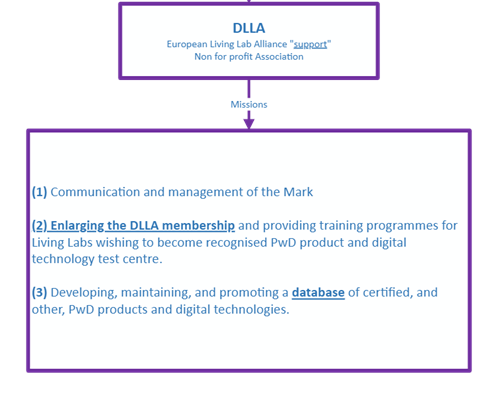Certification Process
Our project supports SMEs in NWE that develop and market innovative, reliable, self-determined home living products for People with Dementia
Partners
You can find a description of each Living Lab, the certification body and finally the DLLA, support association. This description on the website is done by means of texts and videos.
Certification Process
The certification process has been described by GGT. The certification process of Certification‐D is structured in several stages :
- Initial test by the certification body
- Self-declaration
- Test of technical functionality
- Test in the Living Lab
- Evaluation by certification body
Partners of the certification
You can find a description of each Living Lab, the certification body and finally the DLLA, support association. This description on the website is done by means of texts and videos.

ARCK – Alexian Research Center Krefeld of the Alexian Krefeld GmbH
ARCK is part of the non-profit Clinic of Geriatric psychiatry and Psychotherapy, Maria-Hilf-Hospital, Alexian Krefeld GmbH.
To enable and to support people to live at home without institutional care as long as possible, ARCK has developed a Complete Support Network (CSN). To develop improving structures and to investigate efficiency and efficacy of the CSN, is part of the core business. User satisfaction will determine structure and quality of the CSN.
ARCK brings its knowledge about the need of people with dementia and their caregivers for the identification of the criteria for products certification.

OKTOBER
Oktober specialises in Care for the elderly in the Kempen Area offering everything from supportive residential care to specialist dementia care.
In the project Oktober offers a large group of elderly with and without suffering from dementia and an eager team of professionals who look forward to experimenting with new devices, technologies and innovations.
They will work with the university to implement the pilots and to evaluate the created value.

ULSTER
With a progressive approach to teaching, dedication to pushing research boundaries and strong commitment to economic development, Ulster is a responsive, dynamic vibrant centre of learning.
As a regional university, Ulster is uniquely placed to engage with communities, with local leaders and with imaginative partners who share ambitions for Northern Ireland.
Ulster’s reach extends beyond the immediate locality having forged strong alliances with a wide range of partners across the globe.

LUCA School of Arts
Within LUCA School of Arts, the research group, the Dementia Lab focusses on design and dementia.
Its goals are threefold:
- Development of methods to design for and together with people with dementia;
- The creation of objects that support people with dementia and their network of family and (in)formal carer partners to communicate and interact with each other;
- Working as a point of contact between the design sector, care organizations and the (maker) industry.
LUCA bring practical insights, experience in creating for and together with PwD and (user centered and participatory) methods in designing for PwD.
Next to these methods LUCA offer insights on integration of designs in daily life and care.
Having the person with dementia be a partner in the design process will have value on a moral and on a pragmatic level as designs will be a tuned to the wants and needs of PwD.

CENTICH – Information and Communication Technologies National Center of Expertise for Autonomy
The CENTICH is a National Centre of Expertise run by the “VyV3 Pays de la Loire”, member of the VyV group. Its leading the PDL EIP AHA referent site and brings together academics, manufacturers, SMEs as well as user associations to promote ICT as a way to increase autonomy among elderly and disabled people. CENTICH manage a living lab dedicated to the interoperability of the technologies for autonomy and health.
CENTICH Living Lab contribute for:
- the development of employment and turnover for SMEs producing products for PwD;
- increased used of products for PwD resulting in more comfortable and safe conditions for living at home for PwD.

GGT – German Society for Gerontechnology
In this part you can find also a description of the certification Body : GGT.
GGT (DE) is a non-profit certifier, consultant and training organization (SME) with more than 20 years of experience that will contribute its expertise to the development of the certification.
GGT advises industry, trade and crafts around the successful market development in the market of the “Generation 50plus”. The GGT acts as an independent and neutral testing facility.
The spectrum of services offered ranges from market research through product development and labelling and training to sales support and public relations for all demographic change markets.
The project Certification_D allowed GGT to develop a process to certify dementia-sensitive products in collaboration with the Living Labs:
- assessment of the products;
- creation of the concrete process design;
- monitoring of the implementation of product testing in the Living Labs;
- evaluation;
- certification.
A catalog with test and requirement criteria is created and the test procedure is defined and used in the Living Labs.
Finally, the missions of the supporting association are described:

Certification process in details
The certification process has been described by GGT. The certification process of Certification‐D is structured in several stages.
1. Initial test by the certification body
The company contacts the certification body directly or via a Living Lab. Based on the documents made available (brochures, presentations, possibly product samples), an initial test is carried out with which it is determined whether the product could even be suitable for certification.
Exclusion criteria can be, for example:
- The product is not intended for use in the home environment by people with dementia.
- The main user is not the person with dementia (PwD), but the nursing staff / (informal) caregiver.
- The product requires a complex installation in the existing infrastructure in the domestic environment of the PwD (e.g. AAL or Smart Home systems).
- It is a medical product that cannot be tested in the Living Labs due to the ethical framework of the project.
- It is a pre‐series product that is not yet ready for the market.
This list is not final and must be specified for the specific product on a case‐by‐case basis.
As far as possible on the basis of the available data, an assignment to one of the product groups takes place: Leisure/Security/Enabling.
This assignment is necessary because the Living Labs have a corresponding focus of work in this project.
2. Self-declaration
After a positive initial test, the company receives an extensive questionnaire for a self‐ declaration. The company describes its product and the technical requirements for operation and use of the product.
The company also explains to what extent its product meets the requirements for certification by “Certification‐D”. At the same time, the certification body receives at least one functional product from the manufacturer for the purpose of carrying out a preliminary test.
The certification body compares the results of the company’s self‐declaration with the features of the product. If there are significant deviations, these will be clarified in direct dialogue with the company.
If the company meets the mandatory criteria to at least 90% and the optional criteria to at least 75%, the process can be continued.
3. Test of the technical functionality
The certification body carries out a laboratory test of the technical functionality. Various aspects are used for this purpose, which ‐ if applicable to the product ‐ must be fully met. If the relevant requirements are not met, the product cannot be approved for certification.
The measured variables used are based on recognized standards, guidelines and regulations.
The following requirements are considered (if applicable):
- Two senses principle
- Usability of the essential operating elements with regard to the necessary forces
- Usability of the main controls in relation to button sizes
- Color contrasts used
- Sound level of voice announcements and signals
- Cellular notifications
- Radio ranges according to the context of use
- Operation manual
4. Test in the Living Lab
If the product is considered to be technically functional, it can be tested in a Living Lab run by the project partner.
For this purpose, the product is rated by 10 to 12 testers (PwD) on the basis of a questionnaire.
The questionnaire is tailored to the respective product group and is adapted by the certification body to the specific product by the certifier.`The questionnaire is designed in a way that questions about the product and its handling can be filled out independently by the PwD. In addition, there are questions that must be filled out by the researcher of the Living Lab.
In the appendix to the questionnaire, there is also the possibility that caregivers can express their views on the product. The perspective that is essential for the evaluation is only the PwD’s view of the product.
For the practical test, the manufacturer, in coordination with the Living Lab, delivers the corresponding number of functional test products to the Living Lab. The Living Lab delivers the products to the participating households or carries out the tests in a test situation that is comparable to the home environment.
The test period should be one to two weeks for products and one to two months for digital products. During the test phase, the Living Lab is the point of contact for the testers.
The completed questionnaires will be forwarded by the Living Lab to the certification body, where the evaluation will take place.
The data from the questionnaires are evaluated and rated by an algorithm. If the data are consistent and the result of the evaluation is positive, the certification mark can be awarded. In addition to the certification, the manufacturer receives a summary report in which, if necessary, adaptation and development options for the product are listed.
